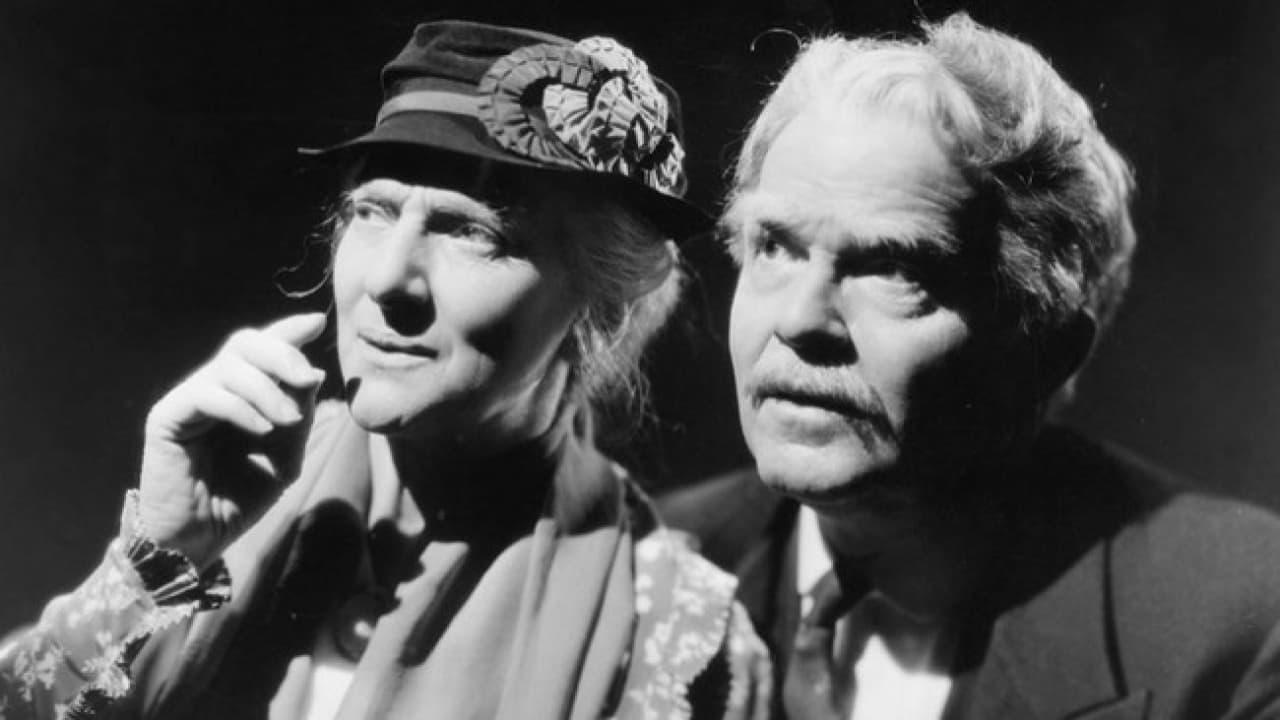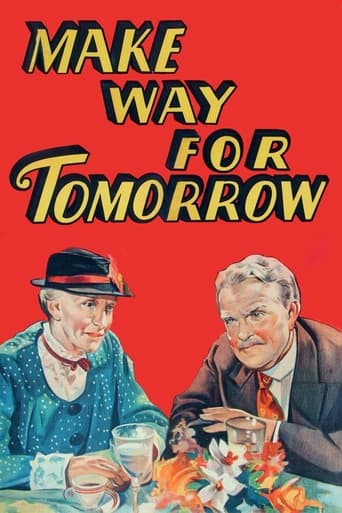Evengyny
Thanks for the memories!
Kailansorac
Clever, believable, and super fun to watch. It totally has replay value.
Neive Bellamy
Excellent and certainly provocative... If nothing else, the film is a real conversation starter.
Anoushka Slater
While it doesn't offer any answers, it both thrills and makes you think.
Hec Tor
Leo Mc Carey delivers a cheerful drama which makes us realize that it is possible to experience being choked up and laughter at the same time with absolutely nothing in-between.To keep the short story short, Lucy (Beula Bondi) and Barkley Cooper (Victor Moore) are an old couple living in the post-depression era. They have given everything to their five children and all they have left is their house and the genuine love they have for each other. Both are forced to go separate ways when they lose their house for financial reasons and none of their children are able to take in both parents. After spending some months apart, they have the chance to spend what seems to be their last day together.Mc Carey's knowledge of human beings is staged in "Make Way For Tomorrow" and satisfactorily gets our sensibility through merely situational moments. No respite is allowed throughout the duration of the film; one feels both amazed and shattered all the time. Sad moments are not created by meanness, there is no evil within the characters, it is their kindness which stands out in almost every situation. After two thirds of the movie a screwball occurs in the story line and even the universe conspires to create magical atmospheres.The ending scene must be one of the most heartrending in the history of cinema and whomever is not torn apart by it, cannot be considered human. If film-making is about arousing people's emotions and transcending through time then "Make Way For Tomorrow" successfully achieves both, making it one of the best films ever made.
pdeprima
I watched this movie yesterday for the second time and cried . What a great old movie. I told 2 people about and cried while I was telling them the story. Too bad they don't make more movies like this. My mother used to say a mother can take care of 10 children but when it comes time for one of them to take care of them no one will.
Sergeant_Tibbs
This is a rare treat. Leo McCarey says that his Oscar for The Awful Truth, won in 1937, was really for Make Way For Tomorrow. I can see why, this film is leagues beyond his other films I've seen. It's a heart-breaking situation. An old couple torn away from each other. It's the saddest image. They've spent their whole life together but can't spend their last years. For a film in this era, Make Way For Tomorrow is remarkably sensitive to the situation. There's such elegance in the way the characters are treated, and it's thanks to Victor Moore and especially Beulah Bondi honest and delicate performances. It's a shame that the plot is mostly full of such triviality during their endeavours at their respective separate homes. It feels like there could've been something deeper to explore here, and they were nearly there. They arrive at the end - and the film's final passage is the definition of poignance as they spend their last hours together. Although it's still full of unfortunate irreverence, its emotional urgency cuts to the core. If only it was a little more focused, a little more consistent, with another handful of those irrevocably poignant moments that hit you near its end then it would be a favourite. It's as close as you can get otherwise.8/10
popcorninhell
During Leo McCarey's acceptance speech for the Academy Award for Best Director he walked up and thanked the Academy then said "…you gave it to me for the wrong picture." The picture he won the prize for was The Awful Truth (1937) which was also nominated for Best Picture, Best Actress, Supporting Actor and Writing. The movie he claimed he should have won for was Make Way for Tomorrow (1937) which got a big goose egg that year. Since 1937, Make Way for Tomorrow has grown in stature to become one of the most revered American movies and certainly among the best films depicting melancholy in old age.Victor Moore and Beulah Bondi star as Barkley and Lucy Cooper, an elderly couple who despite a lifetime of happiness and five children to prove it, are in dire straights. Their home is in foreclosure due in no small part by the depression. They summon four of their five children and try to come up with a game plan deciding that Barkley is to move in temporarily with Cora (Elisabeth Risdon) their impatient daughter in town while Lucy lives with eldest son George (Thomas Mitchell) and wife Anita (Fay Bainter) in his Manhattan estate. Of course as the temporary situation becomes…less temporary, the couple long for each other while the kids look to move them out.Make Way for Tomorrow is arguably the saddest movie ever made; certainly the most tragic of the 1930's. It isn't a classically tragic story like "Oedipus" but a subdued, somber film that gently settles into its wistful conclusion. I say this without caution. Those who feel that cinema provides much more than idle entertainment and happy feelings should waste no time in watching this absolute gem. It brings to mind the classic Tokyo Story (1953) and the recent Amour (2012) in its touching yet unsentimental portrayal of the elderly.The film doesn't demonize the children who push their parents out of their lives for various reasons. One can easily identify with one or more of the kids due to the exemplary acting on the part of Thomas Mitchell, Elisabeth Risdon, Minna Gombell and Ray Meyer. They have their own problems both financial and social which are further complicated by the parents. Anita helps support her family by teaching bridge to socialites yet finds her young daughter running off with older men. In an effort to form trust with her granddaughter, Lucy keeps her social life a secret which understandably insights Anita to say, "What right have you to keep secrets about my daughter from me?" Yet while we as the audience can identify with the children and their own myriad of problems, we know the couple is left with little prospects for the future. The final elongated day-walk through New York City is a particularly bittersweet fifteen minutes. The couple walk hand-in-hand, being provided niceties by strangers who find their love quaint and adorable. Yet while their long-awaited day together is joyous, deep in their minds is the thought that they're still separated and likely to be so for the rest of their lives.Living in a culture that values the young, the new and the adaptive over the old, it's easy to see how this movie may one day disappear into the ether; even if it was submitted into the Library of Congress's National Film Registry. Like it's characters, the film was out of step for its time and likely even more so with today's hustle and bustle. At least the aforementioned and immortalized Tokyo Story was released by a culture that dichotomizes old vs. new instead of shoving its aged things onto the proverbial ice flow like we do. Hopefully with our median population getting ever older we'll reach an understanding where the elderly achieve a little more dignity than decades past. If not, I suppose there are pleasant things to be said about making way for tomorrow.http://www.theyservepopcorninhell.blogspot.com

